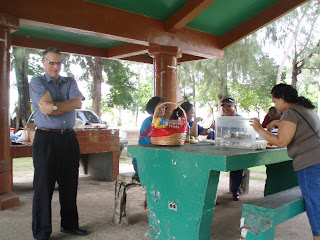ISLA—
Immigration, Security, and Labor Act (originally H.R. 3079, included as Title VII in S. 2739) Passed the Senate on 4/10/2008; Passed the House on 4/29/2008; Signed by President Bush on 5/8/2008.
some key phrases in the
intent section:
“effective border control”
“extending” U.S. immigration laws to the CNMI
“the orderly phasing-out of the nonresident contract worker program”
“the orderly phasing-in of Federal responsibilities...”
“providing a mechanism for continuous use of alien workers, to the extent those workers continue to be necessary to supplement the Commonwealth’s resident workforce”
“to protect those workers from the potential for abuse and exploitation.”
effective date: 1st day of the 1st full month commencing one year after enacted.
Thus, if this bill is signed promptly by President Bush (in May 2008), the effective date would be JUNE 1, 2009.
what happens? This law amends P.L. 94-241 (the Covenant), which had previously exempted the CNMI from the scope of U.S. immigration law, and allowed the CNMI to control its own immigration..
U.S. immigration laws, as defined in 8 U.S.C. § 1101 (a)(17)
[1] go into effect in the CNMI on the start date of the transition period and subject to some exceptions/limitations:
(1) there will be a transition period where U.S. immigration laws apply, allowing entry of aliens under U.S. immigration categories, and operating in tandem with a program operated by U.S. immigration authorities that permits alien workers in the CNMI similar to the current CNMI immigration program under a special CNMI-only/special H Visa program.
(2) only the CNMI asylum/non-refoulement program will be in operation during the transition period; U.S. asylum / non-refoulement is not in operation in the CNMI during the transition period.
On the transition program effective date, all CNMI laws, provisions, and programs relating to the admission of aliens and their removal are superseded and replaced by U.S. law.
when is the transition period? start date
[2] likely 6/1/2009 to end date 12/31/2013
[3].
who’s in charge of immigration? The Secretary of Homeland Security, in consultation with the Secretary of State, the Attorney General, the Secretary of Labor, and the Secretary of Interior.
what happens now--in the pre-transition period? The federal agencies promulgate regulations to deal with the transition. Regarding the tourist visa-waiver program, the regulations must be promulgated within 180 days after enactment of ISLA.
The CNMI may not increase the number of aliens present in the CNMI after the date ISLA is enacted
delays? Possible. If there will be a delay, notice of delay must be published 30 days in advance of start date (i.e. 5/1/2009). The Secretary of Homeland Security (after consulting with the Secretary of State, Attorney General, Secretary of Labor, Secretary of Interior AND the CNMI Governor) may, in his sole discretion, delay the effective date of the transition program for a period up to 180 days. SO START COULD BE AS LATE AS 1/1/2010.
End of transition period can also be delayed as to the section d--CNMI-only/special H Visa program. See reports section, infra.
what happens to the aliens here under CNMI immigration laws? For any alien lawfully present on the start date of the transition period, that alien may not be deported until his CNMI entry permit expires or 2 years elapse, whichever FIRST occurs.
what about entry by aliens during the transition period?
1) Anyone eligible under any U.S. immigration law (including all of the H Visa categories, investor categories, etc.), may enter the CNMI as they would the U.S.
2) Workers under 8 U.S.C. § 1101 (1)(15)(H), without restriction of numerical quota limit. (H Visa)
3) Workers under special provision ISLA sec. 6d, in a CNMI-only/special H Visa
[4] system where Secretary of Homeland Security allocates and determines numbers, terms, conditions to employers, and reduces yearly number allowed, eventually down to zero by 12/31/2013.
[5] (sec. d CNMI only/special H Visa). Spouses and minor children admissible, too, under this special program.
investors?
1) Long-term investors on the start date under the current CNMI law may obtain “CNMI-only nonimmigrant investor” status under 8 U.S.C. §101(a)(15), provided they maintain the investment that formed the basis of their status.
tourists? The Secretary of Homeland Security may institute a visa waiver program for 45 day visits for business or pleasure, after consultation with Secretary of Interior, Secretary of State, Guam Governor and CNMI Governor. Tourists must sign certain waiver of rights.
asylum seekers? The CNMI asylum/non-refoulement program continues in effect. Aliens may not seek asylum under U.S. law until 1/1/2014.
alien spouses of FSM/Palau/RepMar citizens? There is no special provision for these persons. They will likely be considered as aliens with legal status until their permits expire or two years elapse, under the general provision about aliens in the CNMI.what about transfers? There is a special provision that aliens who are admitted to the CNMI under section d (CNMI-only/special H Visas) may transfer between employers during the period of their lawful stay, without permission of the current or prior employer, but within authorized categories for CNMI-special H Visas.what are the new fees for entry? whatever is usually charged for immigration matters, PLUS
1. $150 per non-immigrant worker; paid by §d (CNMI only/CNMI special H Visa program) employer during transition period. This money is remitted to the CNMI for vocational training and education.
what about permanent residency? For those aliens who have green cards (U.S. permanent residency) already, the CNMI is specifically deemed to be part of the U.S. and presence in the CNMI is “considered to be presence in the United States.”
For those aliens who have CNMI permanent residency (under laws that were eventually repealed in the 1980's), there is no clear answer in this new law about ability to adjust status or what status will be recognized.
For those who do not have permanent residency yet, but wish to apply, no grant of status is provided for in this law; however see “reports.”
what about removal/deportation? The Secretary of Homeland Security is the authority for issuing exclusion, deportation, and removal orders, starting on the transition date. He applies whatever U.S. or CNMI law is appropriate to the case.
what happens to employees of CNMI immigration? There is no specific provision for them. The CNMI immigration department will cease to exist when the transition period starts. TSA and other homeland security departments will take-over immigration operations, and will need qualified personnel.
future reports:
1) Secretary of Homeland Security, (consultation with Secretary of Interior and other departments) to Senate Committee on Energy and Natural Resources, Senate Committee on Homeland Security and Governmental Affairs, the Senate Committee on the Judiciary, and House Committee on Natural Resources, House Committee on Homeland Security, and House Committee on Judiciary by 12/1/2008. Report is about current and planned levels of TSA, Customs & Border Protection, Immigration & Customs Enforcement, USCIS, and Coast Guard personnel and resources necessary for fulfilling mission requirements in Guam and CNMI comparable to level provided at other similar ports of entry. Consider military build-up and anticipated growth in tourism.
2) Permissive/not required: annual report from CNMI Governor to President on implementation, with recommendations.
3) Secretary of Interior, in consultation with the Secretary of Homeland Security and the CNMI Governor, to Congress, by 5/2010, on the number of aliens residing in the CNMI, their legal status, the number of years each has been in the CNMI, prediction of need by CNMI economy for future alien workforce, and recommendation about long-term status of workers.
4) GAO to Congress by 6/2010, assessing performance of federal agencies and CNMI Government in meeting congressional intent, short-term & long-term impacts of implementation on economy; and economic benefit of investors grandfathered in; and assessment of number of illegal aliens in CNMI.
5) President to Senate Committee on Energy and Natural Resources, Committee on the Judiciary of the Senate, and House Committee on Natural Resources, and House Committee on Judiciary by 3/1/2011, and every 3/1/ thereafter. Evaluating overall effect of transition program.
6) Secretary of Homeland Security to Senate Committee on Energy and Natural Resources, Committee on the Judiciary of the Senate, and House Committee on Natural Resources, and House Committee on Judiciary, by end of 3 years after start date (6/2012), on projected number of asylum claims
7) Secretary of Labor, after consultation with Secretary of Homeland Security, Secretary of Interior and Governor of CNMI, on current and anticipated labor needs in the CNMI, and shall publish notice in Federal Register, 180 days before end of transition period (6/30/2013), if determines need for CNMI-only/special H Visa workers warrants extension of transition period. Delay of end of transition for this special workers-entry program only—5 years at a time.
8) Permissive, not required. Secretary of Homeland Security (after consultation with Secretary of State and Secretary of Interior) to Senate Committee on Energy and Natural Resources, Senate Committee on Judiciary, House Committee on Natural Resources, and House Committee on Judiciary, about feasibility of creating additional Guam or CNMI-only visa categories.(non-immigrant statuses for investors, students, and retirees, but not for employment) [any time].
Footnotes:
[1] 8 USC §1101 (a)(17) The term "immigration laws" includes this Act and all laws, conventions, and treaties of the United States relating to the immigration, exclusion, deportation, expulsion, or removal of aliens.
[2] But see “delays” infra.
[3] But see “delays” and “reports” infra. [4] Note that this special type of entry permit is not given a name in the ISLA; I call it a CNMI-only/special H Visa because of its characteristics. It will be up to regulations to give it an actual name.
[5] But see “delays” and “reports”.



































 This post covers some basic legal issues on child custody in the CNMI.
This post covers some basic legal issues on child custody in the CNMI.




